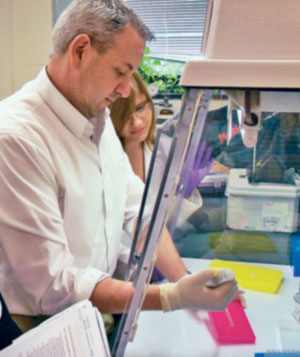Marsit ’00 Studies Molecular Basis of Fetal Origins of Adult Disease
A molecular epidemiologist, Carmen Marsit ’00 researches environmental carcinogenesis and human development—particularly how epigenetic mechanisms and their alterations are responsible for cancer, adverse pregnancy outcomes, and childhood diseases. His innovative work marries molecular biology and genetics in the setting of epidemiologic studies with the goal of investigating gene environment interactions.

Carmen Marsit ’00 (left), assistant professor of pharmacology and toxicology, works with doctoral student Corina Lesseur- Perez in his lab at Dartmouth medical school.
Previously at Brown University, Marsit was recruited to Dartmouth a year ago where he is assistant professor of pharmacology and toxicology at the Norris Cotton Comprehensive Cancer Center, Geisel School of Medicine. Necessary to his work is a collaborative and multidisciplinary team of clinicians, epidemiologists, biologists, and statisticians who, by working together, are uncovering the science behind today’s emerging paradigm that much of adult health and disease have fetal origins.
Although this type of research requires a university’s resources, Marsit says that the critical thinking and writing skills he learned in a small college setting are essential to his success.
“I started college wanting to be a physician, went to graduate school to study environmental health and toxicology, continued training in molecular epidemiology of cancer, and now am funded to study molecular mechanisms through which the environment impacts infant neurodevelopment,” he says, adding that his liberal arts education gave him a strong foundation enabling him to be open to possibilities and to have the flexibility to shift direction.
A biochemistry graduate, Marsit first experienced scientific discovery as an EXCEL Scholar with Joseph Sherma, Larkin Professor Emeritus of Chemistry, and Bernard Fried, Kreider Professor Emeritus of Biology. “That experience allowed me to see that real research is a process—constructing a good question and reasonable hypothesis, using experimental techniques to prove or disprove that hypothesis, writing about that work, and getting it published,” he says.
From that early foundation of having seven articles published in peer-reviewed journals, Marsit is now the author of nearly 100 referred articles. In addition, he holds three patents with other colleagues for specific methods used to detect markers of cancer, has been awarded numerous research grants, is associate editor of the Journal of Cancer Epidemiology, and has supervised and/or advised many undergraduate and graduate students and postdoctoral trainees.
“Working with Dr. Sherma and Dr. Fried introduced me to the concept of collaborative or team science, which now is a major initiative at research institutions across the country,” says Marsit. “They had been introducing their students to this kind of work for many years. It made a strong impression on me.”
Marsit, who holds a doctorate in biological sciences in public health from Harvard University, says, “I want to inspire other people by my research, and I believe that one of the most powerful ways to do that is to teach. I have had excellent mentors throughout my education and my career, and I hope to be that person for others.”